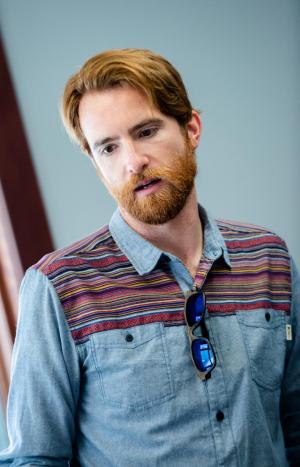Ian McManus Asks Big Political Questions

“I’m really interested in having students understand the complex world in which we live,” says Ian McManus, who joined Marlboro this fall to teach comparative politics and political economy. “We live in societies where economic influences, political institutions, social norms, and culture shape the world around us. So I’m interested in helping students develop the skills to critically analyze that world.”
Ian came to Marlboro from a fellowship in social policy at the London School of Economics and Political Science and a postdoctoral research fellowship at the University of Lisbon. He has a PhD from Northeastern University, where his doctoral dissertation explored the effects of the global financial crisis across welfare states. He teaches courses that offer cross-national perspectives on pressing political, economic, and social concerns, from gender equality to political polarization, subjects that he is passionate about.
For example, in the fall he taught a course on the Politics of Global Inequality. “Students looked at global inequality from a historical context, then saw how it is now, then asked big questions,” Ian says. “Why is it like that? What’s driving inequality? What are the causes and consequences of inequality? And then, ultimately, what are some things we could do to address this issue? So the course is about asking big questions, and trying to have a meaningful impact in the world too.” He also taught a course on populist politics around the world called Rage Against the Machine: Populist Politics in the Age of Trump and Brexit.
Ian enjoys inspiring students to become engaged learners and active participants in our complex political world. He encourages them to bring their own experiences and interests to the classroom, and by doing so contribute to each other’s learning experience. He feels that this creates an environment where the class can explore even the knottiest of questions.
“Ideally you come to class with your own interests and passions, and as you learn more about the world, about policies and outcomes, you can start to think about ‘How can I apply what I’ve learned to issues that I’m passionate about in order to shape the world in important ways?’ I’m trying to get students involved. For instance, I know that there are local community projects that deal with issues like poverty and inequality, so after thinking about global inequality you could also look at inequality in your own community.”
As a politics professor, Ian has a special interest in shared governance at Marlboro and looks forward to being more involved in committees and Town Meeting. His own classes stand to benefit greatly from the college’s emphasis on student engagement in the campus community.
“It’s one thing to be here in person, physically on campus, and another to be engaged in the processes of the college,” Ian says. He is impressed by the diversity of opinion he finds in the classroom, as well as at Town Meeting, in a rural area that one might assume was homogenous. “This idea of direct democracy—being able to have a say in decisions that affect students, faculty, staff, and the whole community— is an exciting one and there is a real focus on this principle at Marlboro, which is really nice. Given Marlboro’s size we are able to engage in democracy and community decision-making in meaningful ways that larger schools couldn’t.”
Meanwhile, Ian is also working on a book based on his dissertation as well as several further articles on the politics of social and economic policymaking across countries. “This work addresses issues like the distributional effects of the Great Recession, the effects of international institutions on domestic policies, the influence of political parties and ideologies on social spending, and the negative effects of inequality on economic growth and social well-being.”
As fate would have it, Ian actually grew up just a stone’s throw away, in Chesterfield, New Hampshire, so has known about Marlboro—“this intentionally small learning community”—for many years. It feels like he has come full circle, after teaching classes with 150 students, to be a part of Marlboro’s more personal educational experience. Besides, he says, “I’ve lived in a lot of different places, but autumn in New England is pretty hard to beat.”
